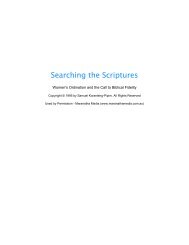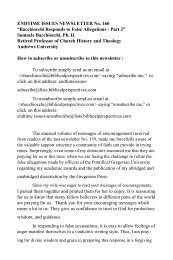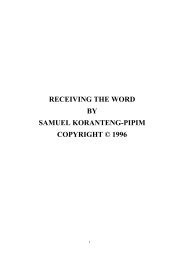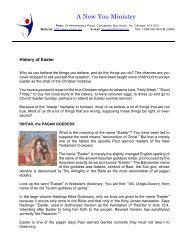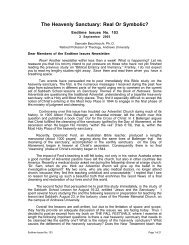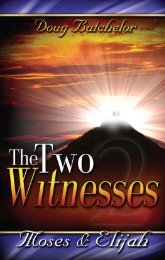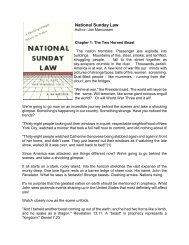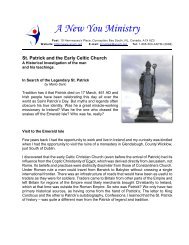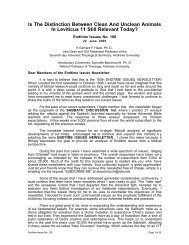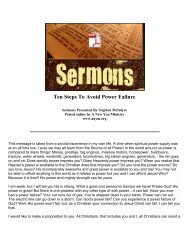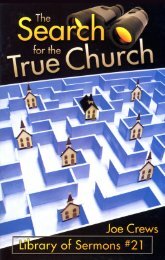Bible Readings for the Home Circleâ1914 - A New You Ministry
Bible Readings for the Home Circleâ1914 - A New You Ministry
Bible Readings for the Home Circleâ1914 - A New You Ministry
You also want an ePaper? Increase the reach of your titles
YUMPU automatically turns print PDFs into web optimized ePapers that Google loves.
BIBLE READINGS<br />
WHAT WAS ABOLISHED BY CHRIST<br />
{405<br />
405}<br />
WHAT WAS ABOLISHED BY CHRIST<br />
1. HOW did Christ’s death on <strong>the</strong> cross affect <strong>the</strong> whole sacrificial<br />
system<br />
“After threescore and two weeks shall Messiah be cut off. . . . And He<br />
shall confirm <strong>the</strong> covenant with many <strong>for</strong> one week: and in <strong>the</strong> midst of <strong>the</strong><br />
week He shall cause <strong>the</strong> sacrifice and <strong>the</strong> oblation to cease.” Dan. 9:26, 27.<br />
2. What did Christ nail to His cross<br />
“Blotting out <strong>the</strong> handwriting of ordinances that was against us, which<br />
was contrary to us, and took it out of <strong>the</strong> way, nailing it to His cross.” Col.<br />
2:14.<br />
3. What did He thus abolish<br />
“Having abolished in His flesh <strong>the</strong> enmity, even <strong>the</strong> law of commandments<br />
contained in ordinances; <strong>for</strong> to make in Himself of twain one new<br />
man, so making peace; and that He might reconcile both unto God in one<br />
body by <strong>the</strong> cross, having slain <strong>the</strong> enmity <strong>the</strong>reby.” Eph. 2:15, 16.<br />
4. To what did <strong>the</strong> ordinances pertain that were thus abolished {406<br />
406}<br />
“Let no man <strong>the</strong>re<strong>for</strong>e judge you in meat, or in drink, or in respect of<br />
an holy day, or of <strong>the</strong> new moon, or of <strong>the</strong> sabbath days: which are a<br />
shadow of things to come; but <strong>the</strong> body is of Christ.” Col. 2:16, 17.<br />
5. From what statement do we learn that <strong>the</strong>se ordinances related to<br />
<strong>the</strong> sacrificial system<br />
“For <strong>the</strong> law having a shadow of good things to come, and not <strong>the</strong><br />
very image of <strong>the</strong> things, can never with those sacrifices which <strong>the</strong>y offered<br />
year by year continually make <strong>the</strong> comers <strong>the</strong>reunto perfect.” Heb.<br />
10:1.<br />
6. What occurred at <strong>the</strong> time of <strong>the</strong> crucifixion which indicated that<br />
<strong>the</strong> typical system had been taken away by Christ<br />
“And, behold, <strong>the</strong> veil of <strong>the</strong> temple was rent in twain from <strong>the</strong> top to<br />
<strong>the</strong> bottom; and <strong>the</strong> earth did quake, and <strong>the</strong> rocks rent.” Matt. 27:51.<br />
7. In what language is this clearly stated<br />
“Then said He, Lo, I come to do Thy will, O God. He taketh away <strong>the</strong><br />
first, that He may establish <strong>the</strong> second.” Heb. 10:9.<br />
8. What is <strong>the</strong> first which He took away<br />
“Above when He said, Sacrifice and offering and burnt offerings and<br />
offering <strong>for</strong> sin thou wouldest not, nei<strong>the</strong>r hadst pleasure <strong>the</strong>rein; which<br />
are offered by <strong>the</strong> law.” Verse 8.<br />
NOTES.— “He taketh away <strong>the</strong> first.” The connection plainly indicates<br />
that what Christ took away was ceremonialism as expressed in<br />
<strong>the</strong> typical service of sacrifices and offerings, and that what He established,<br />
by giving Himself to do <strong>the</strong> will of God, was <strong>the</strong> experience of<br />
doing <strong>the</strong> will of God on <strong>the</strong> part of <strong>the</strong> believer. Thus He made possible<br />
<strong>the</strong> answer to <strong>the</strong> petition which He taught His disciples, “Thy<br />
will be done in earth, as it is in heaven.” Instead of abolishing <strong>the</strong><br />
moral law,, Christ made such provision that every believer in Him may<br />
become a doer of that law.<br />
“The word first here refers to sacrifices and offerings. He takes<br />
<strong>the</strong>m away; that is, He shows that <strong>the</strong>y are of no value in removing sin.<br />
He states <strong>the</strong>ir inefficacy, and declares His purpose to abolish <strong>the</strong>m.<br />
‘That He may establish <strong>the</strong> second’— to wit, <strong>the</strong> doing of <strong>the</strong> will of<br />
God. . . . If <strong>the</strong>y had been efficacious, <strong>the</strong>re would have been no need of<br />
His coming to make an atonement.” Dr. Albert Barnes, on Heb. 10:9.<br />
9. In what statement to <strong>the</strong> woman at Jacob’s well did Jesus intimate<br />
that <strong>the</strong> ceremonial system of worship would be abolished<br />
“Jesus saith unto her, Woman, believe Me, <strong>the</strong> hour cometh, when ye<br />
shall nei<strong>the</strong>r in this mountain, nor yet at Jerusalem, worship <strong>the</strong> fa<strong>the</strong>r.”<br />
John 4:21. {407<br />
407}<br />
NOTE.— The worship of <strong>the</strong> Jews centered in <strong>the</strong> typical system, or<br />
ritual service, of <strong>the</strong> temple, “at Jerusalem,” while <strong>the</strong> Samaritans had<br />
instituted a rival service “in this mountain,” Mt. Gerizim. In His statement<br />
to <strong>the</strong> woman of Samaria, Jesus <strong>the</strong>re<strong>for</strong>e indicated that <strong>the</strong> time<br />
was at hand when <strong>the</strong> whole typical system would be done away.<br />
10. What test case arose in <strong>the</strong> time of <strong>the</strong> apostles over this question<br />
“And certain men which came down from Judea taught <strong>the</strong> brethren,<br />
and said, Except ye be circumcised after <strong>the</strong> manner of Moses, ye cannot<br />
be saved.” Acts 15:1.<br />
11. What requirement was made by <strong>the</strong>se teachers from Judea concerning<br />
<strong>the</strong> ceremonial law<br />
“Forasmuch as we have heard, that certain which went out from us have<br />
troubled you with words, subverting your souls, saying, Ye must be circumcised,<br />
and keep <strong>the</strong> law: to whom we gave no such commandment.” Verse 24.<br />
12. After conferring over this matter, what decision was reached by<br />
<strong>the</strong> apostles<br />
“For it seemed good to <strong>the</strong> Holy Ghost, and to us, to lay upon you no<br />
greater burden than <strong>the</strong>se necessary things; that ye abstain from meats<br />
offered to idols, and from blood, and from things strangled, and from<br />
<strong>for</strong>nication: from which if ye keep yourselves, ye shall do well. Fare ye<br />
well.” Verses 28, 29.<br />
13. What charge was made against Stephen concerning his attitude<br />
toward <strong>the</strong> ceremonial law




